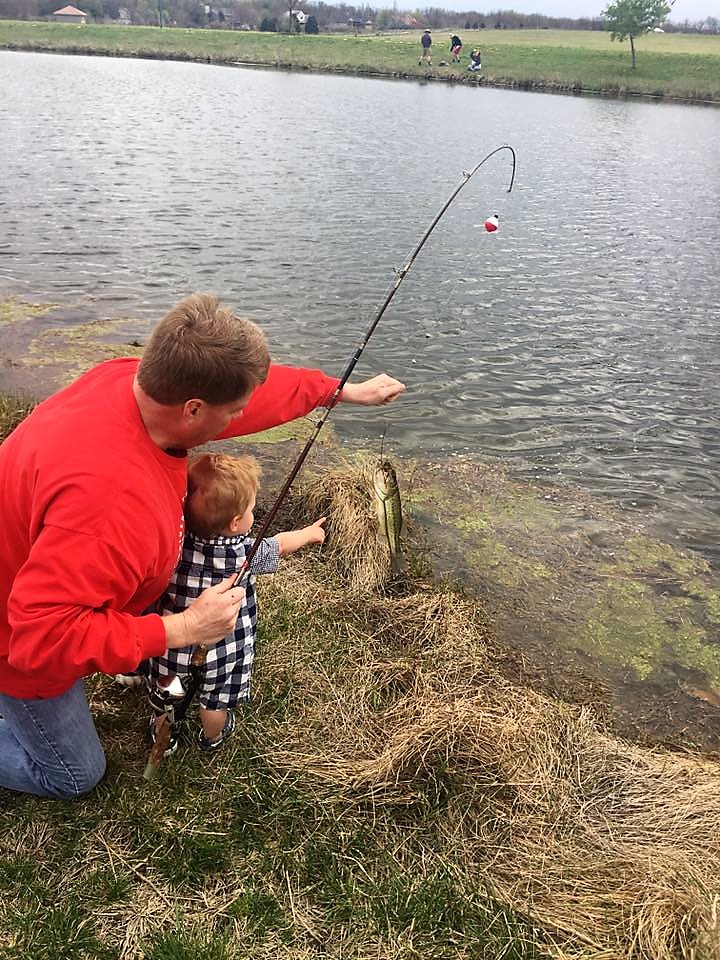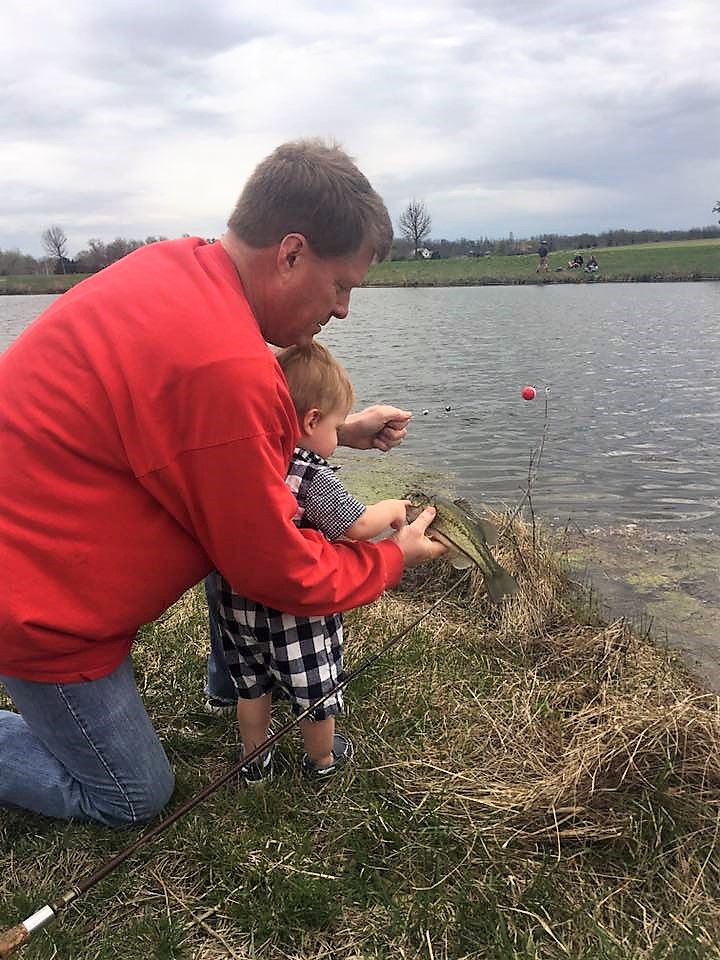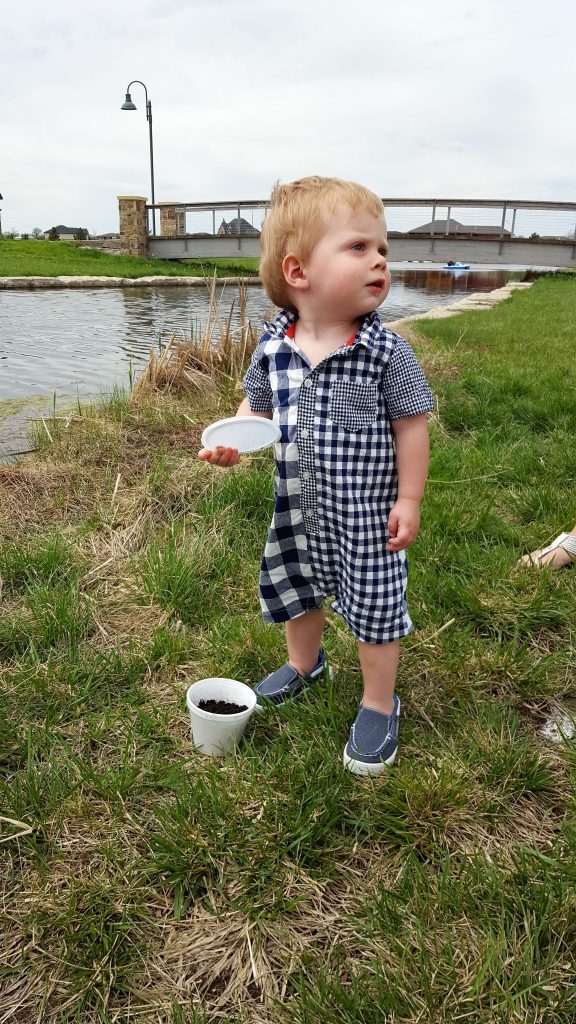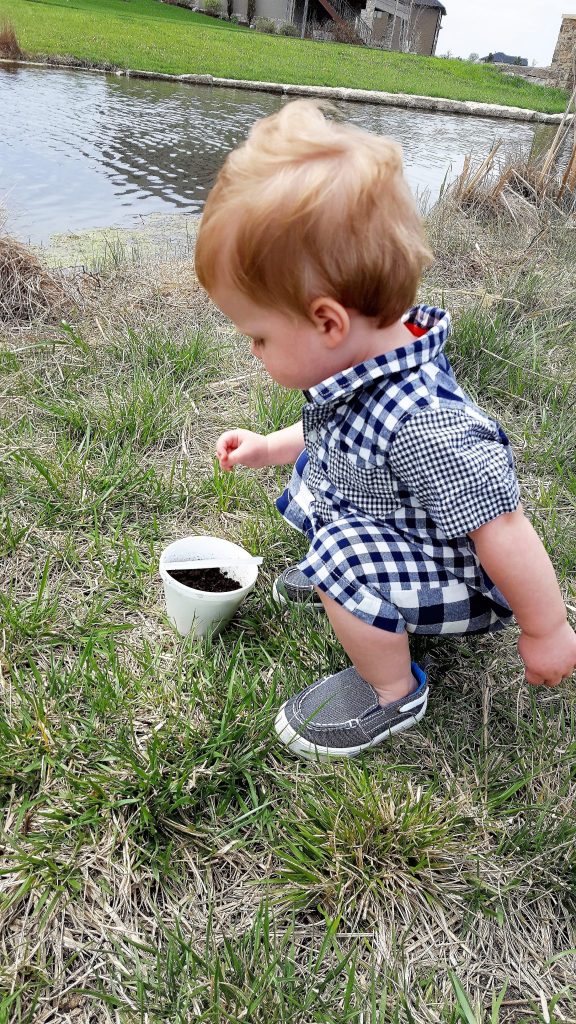He is adorable. He is unpredictable. He is often impatient. He is moving almost nonstop from morning to night.
And, from all indicators, he absolutely loved his first fishing experience!
He is my grandson, 17-month old Jackson Edward Wagner.

For young kids, exposure to something means everything. It’s the make up of young children to touch the very things in their environment that even their parents find somewhat squeamish.
University of Chicago research shows that touch is one of the most important senses for developing children because it helps them start to comprehend the three-dimensional world of which we live, allowing them to physically interact with objects and figure out how things function.
Furthermore, exposure to nature at young ages is critical in this fast paced, technologically driven, concrete, “indoor” world. That has been proven time and again through numerous studies. Kids who play outside tend to be smarter, happier, more attentive, imaginative and confident, as well as less anxious than kids who spend considerable amounts of time inside. It is quintessential for small children to be outside and touch something of nature up close — to touch it, feel it. To get a grasp of it.
A fish represents a classic example of this scenario.

Obviously, with fish, comes fishing!
I am often asked the question: At what age should I introduce my young child to fishing? My answer: As young as possible and when they and you are ready to do that.
Looking back, when I was a very young boy, I recall that one of my all-time favorite things to do in spring and summer was to go fishing.
There was nothing I loved more than to sit out on the bank of our eastern Nebraska sandpit lake or along a river like the Platte, and wait for my line to tighten—for the bobber or lure to disappear, for the rod to bend, for the big one to strike.
The enjoyment came from the entire experience: the wild surroundings of the shoreline, playing with the worms, catching toads, skipping rocks, sitting next to my mom, dad or grandma, the peaceful waiting, the thrill of the catch. I enjoyed every single aspect of it. To this day, it remains one of my favorite outdoor pursuits, and I fish most any chance I get. But, more importantly, I have now begun to cultivate a love of this pastime in my grandson.

Fishing is one of humankind’s oldest pastimes. Historical evidence shows that Neanderthals were fishing by about 200,000 BC.
For children, the natural wonder about water and the love to play in it has always been there. Kids continue to be fascinated by creatures that swim (as any adult who has taken kids to an aquarium can attest!).

When it comes to recreational fishing, it’s easy to do, easy to learn, easy to teach your children or grandchildren, and doesn’t involve a lot of expensive equipment. It’s also the perfect avenue to teach kids about the value of water and our aquatic ecosystems in a way that builds respect, responsible behavior along with indelible memories.
Fishing establishes bonds that last forever.
Fishing offers an opportunity to share deeply personal information mixed with comfortable silence. A fishing trip with a child or grandchild is the ideal activity to begin constructing that close relationship and have fun while doing it!
Fishing has a non-discriminatory facet to it.
Quite simply, the fish a person is trying to catch doesn’t care if their tall or short, big or small, old, middle-aged or young. If a bait or lure is presented sufficiently, a fish will bite no matter who is holding the other end of the line.
Although Jackson won’t be able to join me on serious fishing expeditions for a few years yet, why not expose him to the simplistic essence of what fishing entails?
Here are some tips for a successful fishing trip with the kids in your family:
- Safety. Safety should be your highest priority when taking kids of any age out fishing. Be mindful of the dangers of being on, in or near the water. Wearing a life jacket is a must for everyone in a boat. For young children, life jackets should be worn along steep, slippery banks. The other big safety concern while fishing is hooks. That risk multiplies when a number of people are casting. For older kids, spinnerbaits are great for casting as the hook is less exposed. Avoid casting with treble hooks until the kids have more experience.
- You are the fishing guide! It is best for us adults to leave our own fishing gear at home, especially for a child’s first several fishing trips. Be prepared to tie knots, rig gear, bait hooks, and even make some casts. You may have to take a fish off the hook when your child lands one, but let them know they can touch the fish and lend a helping hand at any time. Be sure to let your child reel in the fish, that is the real fun part of angling!
- Patience, little things and fun! Be patient, listen to your child, and enjoy spending time together! Additionally, try to make the entire trip an adventure. Your child may enjoy all of the little things, the little details that go along with fishing—preparing the boat, buying the bait, eating a picnic lunch, dipping their toes (or shoes) in the water, chasing a turtle, exploring the great outdoors—just as much as they love learning to fish.
- Make the first experiences count! The first few times going fishing with a youngster are crucial ones. If a child has a really bad experience, it may take a lot of effort to overcome those anxieties and negative thoughts. Again, make it fun and keep those fishing outings short. Don’t be afraid to call it a day if your young one starts to get bored, the bugs are bad, or the weather is not good. Having playground equipment and bathrooms nearby is always a good idea as well.
- Keep it simple! Set up a simple small hook, preferably a barbless hook, with an earthworm and a bobber. The bobber serves as a visual on the water and can help keep a child’s attention. Basic medium or light action equipment with smaller reels and shorter rods will serve your youngster well.
- Fish for action! Fishing for abundant species that a child is most likely to catch, no matter the size, will keep their attention and provide them with the incentive to continue fishing. Attention spans for young children are short, about two to six minutes for toddlers, according to childhood experts. These experts also say to not plan on spending more than 30 minutes on the whole with any outdoor trip. Keep in mind some of the easiest known species to catch repetitively from shore are bluegill, green sunfish, black bullheads and largemouth bass. These fish live in a variety of waters and are not difficult to find.
- Fishing skills. Young anglers need a great deal of help determining how to use fishing equipment. Demonstrate to them how rods and reels work and give them plenty of chances to practice. Understand that things will go awry. Probably the biggest mistake that kids make when fishing is not keeping a tight line while playing a fish. Encourage them to keep their rod tip up. Also be sure to check the drag on the reel so they can manage a bit larger fish if they catch one.
- Keep it about the kids! If a child decides to play on the shore, get their feet wet, float sticks, or seek out frogs, let them: it’s all about them having fun! Teach them about fisheries conservation such as how to properly catch and release a fish as well us picking up any litter found along the bank to be recycled. If you bring a fish home, explain to your child or grandchild that they are only bringing to the kitchen what is allowable by law and what they can eat.
- What to pack. Bring enough items so that you’re prepared for all kinds of weather, and distractions if fishing gets difficult or the kids get bored. Sunscreen and insect repellent for children are musts. Don’t forget drinking water. Snacks and snack breaks can do wonders for very young anglers. Crackers, cheese sticks and cut up fruit all fit the bill. Sure, we want kids to eat healthy, but I’m not against making the outing special by bringing a favorite treat or stopping by the ice cream shop on the way home. Take along what you think will help make the fishing experience comfortable and fun. Towels, wet wipes and band aids should be packed. By all means, include a camera. In all seriousness, a positive attitude is probably the most important. Your enthusiasm for fishing will be contagious!
- Attend a kids’ or family fishing event with your child. The Nebraska Game and Parks Commission holds hands-on fishing events to teach both children and their parents or grandparents about the fun of recreational fishing. These events are held mainly during early evening hours at various locations around the state, feature trained instructors, and provide loaner equipment and free bait for those folks to use during their time on the water. Get more information about such events here. Have fun!

The post FUNdamentals of Fishing appeared first on NEBRASKALand Magazine.
















